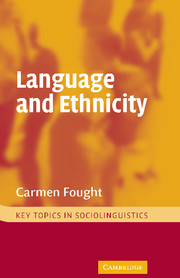Book contents
- Frontmatter
- Contents
- Preface
- Acknowledgments
- Part I General issues in ethnicity and language
- 1 What is ethnicity?
- 2 Language and the construction of ethnic identity
- Part II Linguistic features and ethnicity in specific groups
- Part III The role of language use in ethnicity
- Notes
- Glossary of terms
- References
- Index
- References
2 - Language and the construction of ethnic identity
Published online by Cambridge University Press: 05 September 2012
- Frontmatter
- Contents
- Preface
- Acknowledgments
- Part I General issues in ethnicity and language
- 1 What is ethnicity?
- 2 Language and the construction of ethnic identity
- Part II Linguistic features and ethnicity in specific groups
- Part III The role of language use in ethnicity
- Notes
- Glossary of terms
- References
- Index
- References
Summary
When people ask me [about ethnicity] I say Mexican but, but then they say, “No you're not. You don't speak Spanish.” They, they just tease me to get me mad … I guess a lot of people think if you don't speak Spanish you're not like full Mexican or whatever, but, but I am! I think so.
(Veronica, a 17-year-old Latina from Los Angeles, from Fought 2003)A few years ago, I watched a television documentary called Urban Invaders, a somewhat lighthearted treatment of the topic of rats in New York City. The residents who were interviewed about their experiences with rats included an African-American woman, a Puerto Rican American woman, and a European-American man. Each of these people clearly sounded like a New Yorker, and yet none of them spoke exactly like the others. All of them exhibited some features characteristic of New York City in their phonology, such as raised [ɔə] (found in, e.g., more or floor), which occurred across all three speakers; however, each of these individuals also used variants linked to his or her ethnicity. The African-American woman used phonological features of African American Vernacular English (AAVE), such as [f] for [θ] in teeth and monophthongization of [aj] as [a] in climbing. For the Puerto-Rican American woman, the vowels [i] and [u] were realized with no glide and slightly higher than in other dialects. Presumably, the European-American man who was interviewed also indexed his ethnic identity in some way.
- Type
- Chapter
- Information
- Language and Ethnicity , pp. 19 - 42Publisher: Cambridge University PressPrint publication year: 2006

